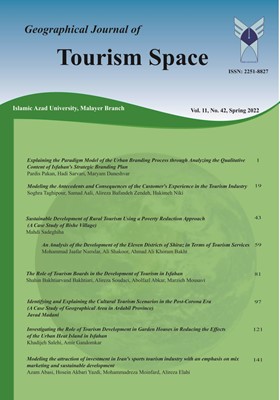Sustainable Development of Rural Tourism Using a Poverty Reduction Approach (A Case Study of Bishe Village)
Subject Areas :
mahdi sadeghiha
1
*
1 - Master of Urban Planning, Shahid Beheshti University, Tehran, Iran
Received: 2022-03-25
Accepted : 2022-05-19
Published : 2022-05-22
Keywords:
Rural tourism,
Strategic Planning,
Sustainable Tourism,
pro-poor tourism,
Bisheh village,
Abstract :
Tourism is a comprehensive activity that is very effective in social and economic development. On the other hand, tourism is designed to reduce poverty, to increase the net benefit of the poor from tourism, and ensure that tourism growth helps reduce poverty. This study has been compiled to plan sustainable tourism with emphasis on reducing poverty in Bisheh village, which is one of the areas with tourism potential in Khorramabad, which also uses the concepts of rural tourism. In cognition, documentary study methods and survey methods such as questionnaires have been used. The present study is descriptive-analytical. In cognition, documentary study methods and survey methods such as questionnaires have been used. In the questionnaire, indigenous people, officials, and tourists were asked for their opinions, and due to the low number of the statistical population, the theoretical saturation method was used to obtain the appropriate number of each sample. Strategic planning methods such as the QSPM matrix and SWOT table were used in the analysis. Also, based on the model resulting from the three types of tourism proposed in the study, six categories of tourist attractions, economic, socio-cultural, educational, environmental, and government by identifying, analyzing, and providing solutions mapped the path to achieve the goals. In the end, the research results showed that Bisheh village and Qamar villages can be connected through green infrastructure (green roads) and create a tourism complex and attract more tourists to the area, using the natural potentials and handicrafts of the village. Also, with the people’s participation in tourism-related activities, the poverty of the local people of this region will be reduced.
References:
رمضانزاده لسبوئی، م. اکبریان رونیزی، س. رمضانی فر، ح. حیدری، ز. 1394. توسعۀ گردشگری در شهرهای ساحلی و امنیت اجتماعی (مطالعۀ موردی: شهر تنکابن). پژوهشهای جغرافیای برنامهریزی شهری. 309-324.
صادقیها, م, نوری, س. (1400). برنامهریزی توسعه گردشگری و فضایی شهر نور با بهرهگیری از رهیافت شهر خردورز. فصلنامه جغرافیایی فضای گردشگری, 10(38), 1-18.
قره نژاد، ح. 1374. مقدمهای بر اقتصاد و سیاستگذاری توریسم. چاپ اول. انتشارات مانی.131 صفحه.
مرکز آمار ایران، 1390، بلوکها و اطلاعات آماری شهرستان خرم آباد.
محلاتی، ص. 1382. جهان گردی شهری. چاپ اول. نشر دانشگاه شهید بهشتی.196 صفحه.
منشی زاده، ر ، نصیری، ف، 1380، گردشگری روستایی : انتشارات منشی.478 صفحه.
Blancas, F. J., & Lozano-Oyola, M. (2022). Sustainable tourism evaluation using a composite indicator with different compensatory levels. Environmental Impact Assessment Review, 93
Goodwin, H. (2006). community-based tourism. UK: University sussex.
Helgadóttir, G., & Dashper, K. (2021). 20 years of Nordic rural tourism research: a review and future research agenda. Scandinavian Journal of Hospitality and Tourism, 21(1), 60-69.
Kotler, P., & Gertner, D. (2002). Country as brand,product,and beyond:A place marketing and brand management perspective. Journal of Brand Management,9, 249–261.
Knight, D. W. (2018). An institutional analysis of local strategies for enhancing pro-poor tourism outcomes in Cuzco, Peru. Journal of Sustainable Tourism, 26(4), 631-648.
Liu, Y., & Yu, J. (2022). Path dependence in pro-poor tourism. Environment, Development and Sustainability.
Lo, K., Li, J., Wang, M., Li, C., Li, S., & Li, Y. (2019). A comparative analysis of participating and non-participating households in pro-poor tourism in Southern Shaanxi, China. Tourism Planning & Development, 16(3), 318-333.
Martínez, J. M. G., Martín, J. M. M., Fernández, J. A. S., & Mogorrón-Guerrero, H. (2019). An analysis of the stability of rural tourism as a desired condition for sustainable tourism. Journal of Business Research, 100, 165-174.
Musavengane, R.(2018).Toward pro-poor local economic development in Zimbabwe The role of pro-poor tourism.African Journal of Hospitality,Tourism and Leisure,7(1),114.
Pato, L., & Kastenholz, E. (2017). Marketing of rural tourism–a study based on rural tourism lodgings in Portugal. Journal of Place Management and Development.
Roe, D. &. (2001). Pro -Poor Tourism: Harnessing the World’sLargest Industry for the World’s PoorWorld summit on sustainable development.
Rosalina, P. D., Dupre, K., & Wang, Y. (2021). Rural tourism: A systematic literature review on definitions and challenges. Journal of Hospitality and Tourism Management, 47, 134-149.
Streimikiene, D., Svagzdiene, B., Jasinskas, E., & Simanavicius, A. (2021). Sustainable tourism development and competitiveness: The systematic literature review. Sustainable development, 29(1), 259-271.
Strange, l. (2007). Pro-Poor Tourism in the Greater Mekong Sub-Region.
Villanueva-Álvaro, J. J., Mondéjar-Jiménez, J., & Sáez-Martínez, F. J. (2017). Rural tourism: Development, management and sustainability in rural establishments. Sustainability, 9(5), 818.
Wen, S., Cai, X., & Li, J. (2021). Pro-poor tourism and local practices: An empirical study of an autonomous county in China. Sage Open, 11(2).
Yu, L., Wang, G., & Marcouiller, D. W. (2019). A scientometric review of pro-poor tourism research: Visualization and analysis. Tourism Management Perspectives, 30, 75-88.
Zeng, B. (2018). How can social enterprises contribute to sustainable pro-poor tourism development?. Chinese Journal of Population Resources and Environment, 16(2), 159-170.
_||_

